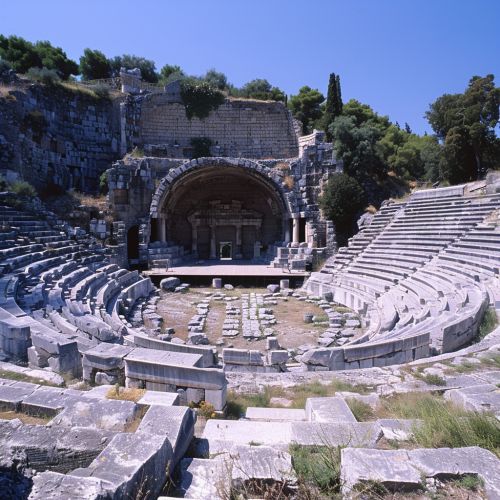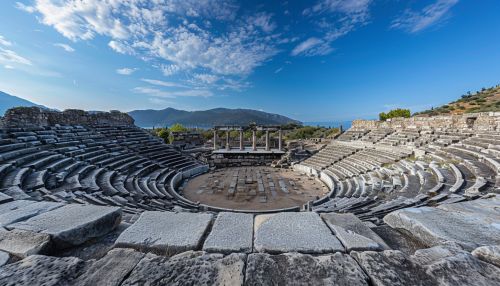Ancient Greek Theatre
Origins and Development
The origins of ancient Greek theatre date back to the 5th century BC, during the flourishing period of the Classical Greek era. The theatre was a significant part of the Greek culture and was deeply intertwined with their religious rites, political affairs, and social gatherings. The theatrical performances were held in open-air amphitheatres and were a blend of music, dance, and drama, which were all integral parts of the Greek festivals.


The earliest form of Greek theatre was the tragic drama, which evolved from the dithyrambs, choral hymns sung in honor of the Greek god Dionysus. The first tragedian known to us is Aeschylus, who introduced the second actor, thus creating the possibility of dramatic dialogue. His successors, Sophocles and Euripides, further developed the tragic form, introducing the third actor and expanding the use of the chorus.
Structure of the Theatre
The ancient Greek theatre was a complex structure, designed to accommodate large audiences and to enhance the theatrical experience. The main components of the Greek theatre were the Orchestra, the Skene, and the Audience.
The Orchestra was the circular performance space where the chorus would sing, dance, and interact with the actors. The Skene was a building at the back of the stage where the actors could change their costumes and masks. The Audience, also known as Theatron, was the viewing area, usually built into a hillside, providing excellent acoustics for the spectators.
Genres of Ancient Greek Theatre
The ancient Greek theatre was dominated by three main genres: Tragedy, Comedy, and Satyr play.
Tragedy, the most prestigious genre, dealt with serious themes and was often based on mythological stories. The tragedies were characterized by their dramatic structure, consisting of Prologue, Parodos, Episodes, Stasimon, and Exodos.
Comedy, on the other hand, was a lighter genre, often satirizing public figures and societal norms. The comedies were divided into Old Comedy, represented by Aristophanes, and New Comedy, represented by Menander.
Satyr plays were a unique blend of tragedy and comedy, featuring choruses of satyrs, mythological creatures who were half-man and half-beast. These plays were usually performed as a lighter relief after the intense tragedies.
Impact and Legacy
The ancient Greek theatre has had a profound impact on the development of Western drama and theatre. The concepts of tragedy and comedy, as well as the structure of the theatre itself, have been inherited by the modern theatre. The works of the ancient Greek playwrights are still performed today, testifying to their timeless appeal.
See Also
References
1. Brockett, Oscar G. History of the Theatre. Allyn and Bacon, 1991. 2. Ley, Graham. A Short Introduction to the Ancient Greek Theater. University of Chicago Press, 2006. 3. Rehm, Rush. Greek Tragic Theatre. Routledge, 1992.
